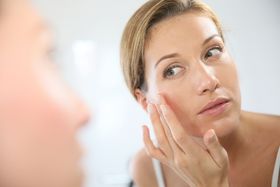Hair Loss From Excess Vitamin A—Is It Possible?
Published July 30, 2022.

Vitamins are essential for maintaining health and adequate bodily functioning. As the body does not produce these nutrients, they must be synthesized through diet or via supplements. One of the primary nutrients is vitamin A, a fat-soluble vitamin that supports vision, cell and hair growth, and a healthy immune system (1).
But, an excess of anything is bad for health, and so is the case with vitamin A. Though there may be many causes of hair loss, high concentrations of this vitamin can potentially induce hair thinning and rapid hair loss.
How Excess Vitamin A Causes Hair Loss
Many vitamins and minerals are required for good hair growth. Vitamin A is of two types, preformed vitamin A or retinol that is obtained from animal products or by using dietary supplements. The other type is provitamin A or carotenoids, which the body converts to vitamin A.
Retinol is useful in normal quantities as it helps to stimulate the hair follicles and induce hair growth. It also helps produce sebum, an oily substance that aids in keeping the hair moisturized and healthy (2).
However, when there is too much retinol stored in the body, it over-stimulates the hair follicles. As hair growth gets accelerated, the natural growth phase also ends quickly, resulting in faster hair fall and, thus, increased hair loss.
Signs and Symptoms of Excessive Vitamin A
Symptoms of excess vitamin A (hypervitaminosis) can exhibit acute effects arising from the intake of daily high doses or chronic effects that arise from overconsumption of vitamin A supplements through prolonged periods.
When vitamin A is in excess, the body exhibits certain signs and symptoms as a warning of toxic levels (3)(4).
Acute vitamin A toxicity symptoms include:
- Nausea
- Abdominal pain
- Vomiting
- Headache
- Drowsiness
- Hair shedding
- Increased intracranial (brain) pressure (5)
Chronic vitamin A toxicity signs include:
- Changes in vision
- Coarse skin
- Severe headaches
- Skin peeling
- Bone pain
- Confusion
- Rapid hair loss (alopecia)
- Increased lipid levels (hyperlipidemia)
Signs of excess vitamin A in children include (6):
- Headaches
- Vomiting
- Fever
- Diarrhea
- Blurred or double vision
- Bulging of the soft spot (fontanel) on skulls in infants
- Weight loss
- Bone abnormalities
- Respiratory infections (7)
Extreme levels of vitamin A can result in:
- Osteoporosis
- Liver damage
- Kidney damage resulting from excess calcium (hypercalcemia) (8)
- Deformities in the fetus during pregnancy
- Coma
- Death
Treating Hair Loss Caused By Excess Vitamin A
If your practitioner suspects excess consumption of vitamin A to be the culprit behind hair loss, then stopping the intake of vitamin A supplements and foods containing carotenoids may be a suitable option.
A lack of other vitamins and minerals such as B vitamins, vitamin C, zinc, and iron can also be responsible for hair loss, and so consuming foods that are rich in these nutrients may be recommended to encourage hair growth. Additionally, a supplement containing biotin and collagen for hair loss might help—using a nutritional supplement with the right blend of multiple ingredients can provide natural hair support to sustain healthy growth.
Finally, certain amino acids may also benefit hair loss, alongside certain trace minerals.
Recommended Vitamin A Dosage
Daily intake levels for vitamin A can vary for children, men, and women, depending on age. In women, there may be increased need during pregnancy and lactation. The recommended doses, according to the National Institute of Health (NIH), are (9):
- Birth to 6 months: 400 mcg RAE
- Infants 7–12 months: 500 mcg RAE
- Children 1–13 years: 300-600 mcg RAE
- Teen and adult females: 700 mcg RAE
- Teen and adult males: 900 mcg RAE
- Pregnant teens and females: 750-770 mcg RAE
- Breastfeeding teens and adults: 1,200-1300 mcg RAE
Conclusion
Vitamin A is an essential nutrient required to support many functions in the human body. However, chronic intakes of vitamin A, unless recommended by a practitioner, can result in increased concentrations. This can induce multiple side effects, including severe hair loss.
Recognition of symptoms and taking remedial measures, such as discontinuing intake of vitamin A supplements, may help reverse vitamin A toxicity and lower hair loss.







